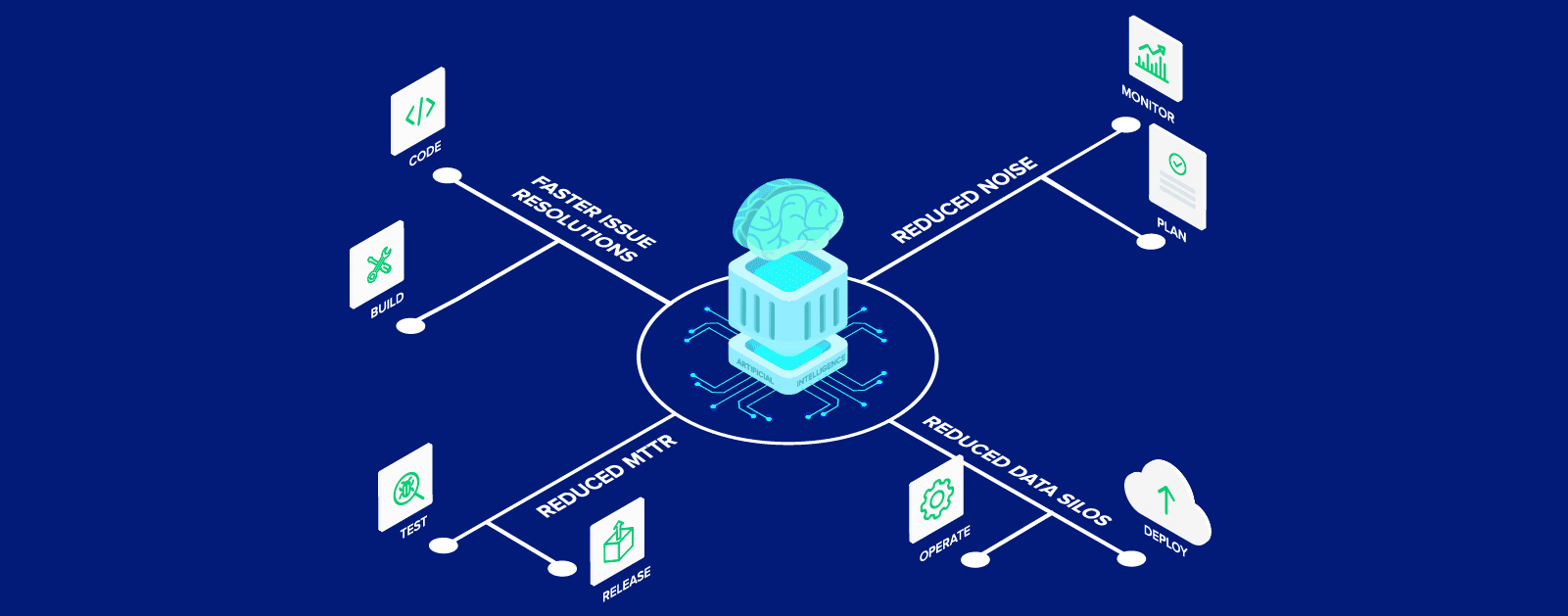The role of AIOps in the DevOps story

Beginning with huge systems occupying large physical space, technology has enabled smaller, versatile devices that can be used anywhere at anytime. From the communications and hospitality industries to the public sector, either on-premises, cloud, or hybrid services were employed to make processes cost-effective. With the digitization of IT ushering in innovative ideas in response to societal and technological transitions, developments became faster, requiring businesses to up their game with more processes and services.
However, managing numerous tasks and colossal amounts of data became tiresome and project deadlines often slipped, so a solution for efficiently handling the IT development process became a necessity. A lack of collaboration between developers and the operations team started affecting the development process, and enterprises realized the necessity of establishing a good rapport between the teams for achieving better results. DevOps, a combination of software development and IT operations, was implemented to speed up the development process; it ensured faster, more effective processes, along with an improved end-user experience.
The agility and ease with which DevOps managed the entire workflow made it a favorite of business entities across the globe.To keep up with the pace, enterprises adopted cloud-native applications like containers and microservices to make processes faster, but that made the job of the DevOps team more complex. They needed a robust solution capable of identifying and eliminating all these issues while ensuring an uninterrupted digital experience.
Along came AIOps, or artificial intelligence for IT operations, to assist DevOps teams in handling routine IT tasks. According to Gartner, AIOps stands for "the application of machine learning and data science to IT operations problems." By combining machine learning and artificial intelligence, AIOps analyzes mammoth amounts of data to enhance the performance of IT operations. In each stage of the workflow, from coding to deployment, AIOps assists DevOps teams in detecting recurring patterns and resolving issues before customers are affected.
The importance of AIOps
By perfectly blending automation, performance management, and service management, AIOps enables continuous testing, accelerated development cycles, and refined services. Here are a few other reasons why AIOps is inevitable for every DevOps team:
Reduced MTTR
Checking the mean time to repair (MTTR) helps determine the impact of an incident on an organization's bottom line. With AIOps, IT teams can reduce their MTTR, keep repeated events in check, and resolve incidents in the production stage.
Reduced noise
Multiple alerts for the same issue can be a distraction for the DevOps team during issue resolution. One of the benefits from using AIOps is reduced noise across the ecosystem, as AIOps lowers the number of false alerts considerably.
Enhanced visibility
Solving performance issues can be a challenge. With AIOps, organizations can achieve greater visibility into the service ecosystem to analyze recurring trends, and employ automated response mechanisms when issues recur.
Reduced data silos
Procuring real-time data is easier with AIOps as it breaks down silos and ingests data as logs and metrics, making pattern identification easier using certain algorithms.
The role of Site24x7
Handling multiple tools can make the monitoring process more tedious, so a full stack monitoring platform can be the best solution for all the issues faced by DevOps. Here comes the role of Site24x7, an all-in-one monitoring platform for DevOps and IT operations.
Site24x7's AI-based anomaly detection system helps identify unusual spikes or variations in critical metrics like response time, CPU usage, and memory usage. It identifies recurring patterns in the metrics, and predicts possible outages to aid in fixing issues before they affect end users. DevOps teams can use the data obtained from this process to improve operational efficiency. The time DevOps and IT teams spend cross-checking thresholds from various monitors and troubleshooting can be reduced using Site24x7. Forecasting features from Site24x7 identify unusual behavior of various infrastructure in an environment and can help organizations stay hassle-free. Teams can closely observe the behavior of various metrics using the Anomaly Dashboard and stay updated with timely alerts.
In the days to come, AIOps is predicted to expand automation, making processes faster and easier for DevOps teams. So make your DevOps journey smarter with Site24x7.